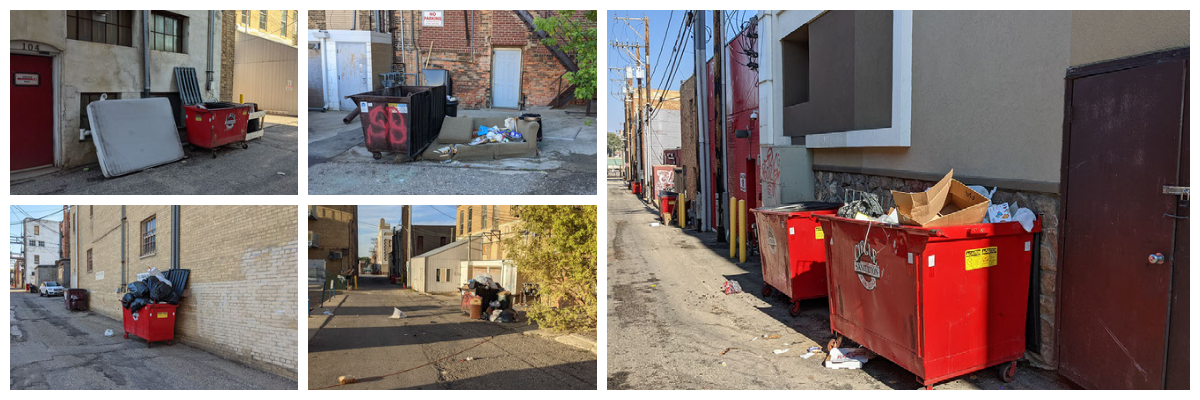The compact nature of the downtown environment makes trash management and collection a challenge, but it’s a challenge we must take on. There are few things more off-putting to visitors than an unkempt place. And what message do we send to citizens, customers, investors, and elected officials when we lack the basic self-respect to keep our environment clean?
There are a few modest policy changes that may provide assistance, but the first step on the road to improvement is an acknowledgment that we bear the most responsibility on this issue and the outcome we want.
Identified Challenges & Solutions
It’s not just downtown garabge causing our problems, at least some of the trash is being imported because we’re an easy drop off point with so many unsecured dumpsters. Identified steps and partial solutions include:
- Securing Dumpsters. This is an individual step each property owner can take. It will not be an instant or singular solution, but with less access to easy dumping, we will slowly see improvement. This will create inconviences for sure, but it’s important to understand improvement will not come without costs.
- Communication on Illegal Dumping. It’s possible, maybe even probable, that many contributing to this problem do not realize what they’re doing. Illegal dumping signage and friendly reminders may have an immediate impact.
- Illegal Dumping Enforcment & Fines. We can reduce access, but that will only elminate the opportunity. It does nothing to stop the recidvist offenders. For this, we may need a negative incentive and a few examples.
- Standardized Regulatory Environment. Many of Minot’s trash handling policies are set through the City’s zoning and planning ordinance and are dependent on property’s zoning. However, in downtown, we have multiple zoning districts that run from R1 to Industrial. This makes consistent minimum standards throughout downtown difficult to achieve.
- Related Issue: Downtown Overlay District
- Franchise Agreements. Franchise agreements are made by the City with firms that wish to provide service in a defined area. The City uses them regularly to set terms and expecations for things like utility and phone service. This is a potential solution to standardize practice among waste management firms to improve accountability and set standards. These agreements could, if crafted intintionlly, create more balanced responsiblity sharing between the waste managment firms and the property owners.
- Graffiti Management. It’s not just on buildings. Graffiti regularly ends up on trash containers both public and private. In an environment with healthy self-respect, these issues are resolved quickly.
- Extend Areas with Public Trash Recpticals. The City manages and removes trash from public recepticals on Main Street. Increased investment and redevelopment is extending the need for this service to other parts of downtown.
- Related Issue: Business Improvement District
Status, Next Steps, Progress, & Partners
Much of this work is in the initial seed planting stage. Hopefully, simple awareness and acknowledgment will drive incremental progress and reduce the need for regulatory or punitive actions. Possible next steps include:
- Continued awareness and educadtion among property owners, business owners, residents, and visitors.
- A survey/study or high-level evaluation of existing services, providers, methods, costs.
- Evaluation of how possible recycling implmentation will impact these challenges and the environment.
- These outcomes will be driven by working closely with the property owners, residents, waste management firms, and the City of Minot’s planning and public works departments.
